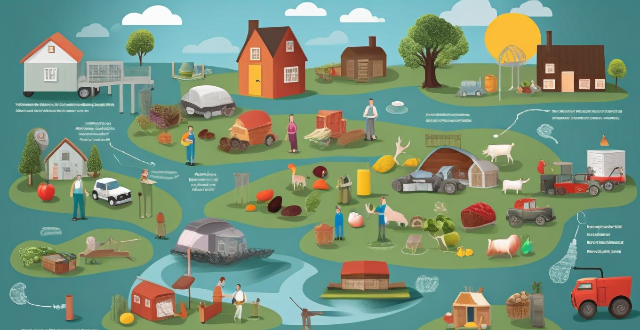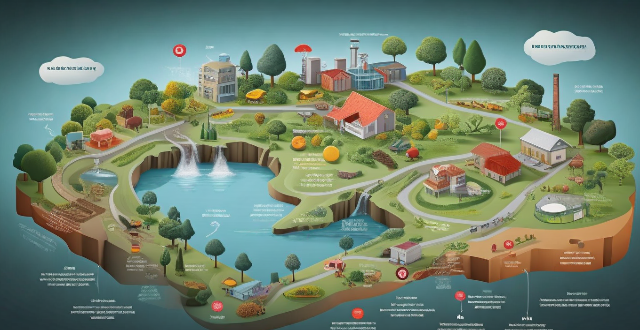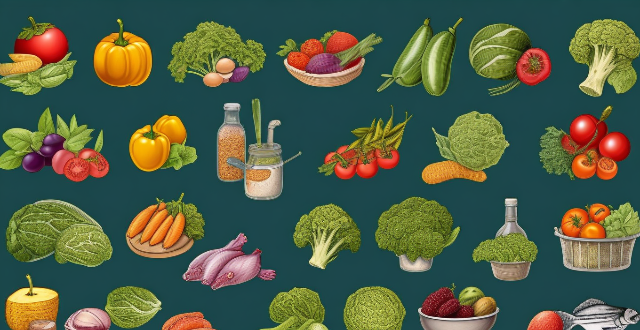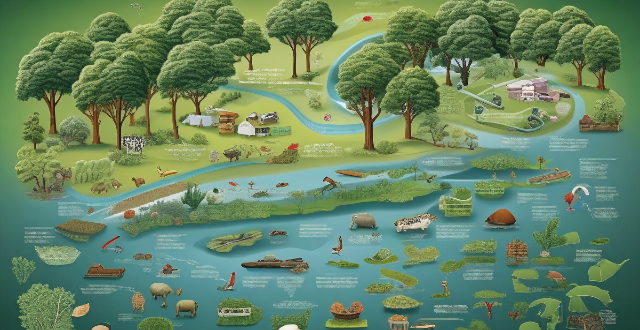Food Disease

Can eating organic food prevent diseases ?
Eating organic food may offer some potential benefits for disease prevention, such as reduced exposure to pesticides and chemicals, higher antioxidant levels, and better nutrient content. However, the overall evidence supporting its ability to prevent diseases is limited, and other factors influencing disease risk should also be considered when making dietary choices. It is important to prioritize a balanced and varied diet rich in fruits, vegetables, whole grains, lean proteins, and healthy fats while minimizing intake of processed foods and sugary beverages.

What are some good gluten-free food options for people with celiac disease ?
Celiac disease is an autoimmune disorder that damages the small intestine and requires a strict gluten-free diet. Good gluten-free food options for people with celiac disease include fruits and vegetables, meat and fish, gluten-free grains and starches like quinoa and brown rice, dairy products, nuts and seeds, gluten-free flours and baking mixes, and gluten-free snacks and beverages like popcorn and juices.

What impact do climate predictions have on agriculture and food security ?
Climate predictions significantly impact agriculture and food security by enabling informed decision-making among farmers. These decisions cover aspects such as crop planning, pest and disease management, water conservation, livestock care, and adaptation to market dynamics. By considering predicted weather patterns, temperature changes, and precipitation levels, farmers can optimize crop yields, reduce losses due to pests and diseases, conserve water resources, ensure proper nutrition for livestock, and adapt to changing market conditions. This results in sustainable agricultural practices that contribute to global food security.

Can exercise reverse heart disease ?
Heart disease is a major cause of death worldwide, and it can be devastating to those affected. While there are many treatments available for heart disease, including medication and surgery, some people wonder if exercise can reverse the damage caused by heart disease. There is evidence that regular exercise can help prevent and manage heart disease by improving cardiovascular health, managing weight, lowering blood pressure, improving cholesterol levels, and reducing stress. However, there is no conclusive evidence that exercise can completely reverse heart disease. Despite this, there are still many benefits to regular exercise for heart health. If you have been diagnosed with heart disease or are at high risk for developing it, talk to your doctor about starting an exercise program. They can help you create an exercise plan that is safe and effective for your individual needs and goals.

How does climate change influence childhood diseases and nutrition ?
This article discusses the impact of climate change on childhood diseases and nutrition, highlighting increased risks of infectious diseases, respiratory issues, heat-related illnesses, waterborne diseases, food insecurity, nutrient depletion, access to nutritious foods, and dietary diversity. It emphasizes the need for a multifaceted approach that includes mitigating greenhouse gas emissions and adapting to changing environmental conditions while ensuring equitable access to healthcare and nutritious food for all children.

How does climate change influence nutrition and dietary health through changes in food production ?
Climate change affects nutrition and dietary health by altering food production, impacting crop yields, nutrient content, pest and disease pressure, and the availability and accessibility of food. Sustainable agricultural practices and adaptation are crucial for mitigating these effects and ensuring global food security.

How does climate change affect agriculture and food security ?
Climate change significantly affects agriculture and food security by increasing extreme weather events, altering crop yields and quality, impacting livestock, and raising concerns about food access, affordability, and biodiversity loss. Adaptation and mitigation strategies such as sustainable farming practices, water management, genetic research, and policy initiatives are essential to build a resilient food system.

How do vaccines work to protect against disease ?
Vaccines protect against disease by introducing a small amount of the pathogen into the body, triggering the immune system to produce antibodies that protect against future infections with the same pathogen. There are several types of vaccines with unique mechanisms of action and effectiveness against specific pathogens. The development of vaccines is a complex process requiring extensive testing and research, but they have been shown to be highly effective at preventing serious diseases.

How has global warming affected agricultural practices and food security ?
Global warming has significantly influenced agricultural practices and food security worldwide, affecting areas such as altered climate conditions, pest and disease management, crop variety and production, and food security concerns. These changes include irregular rainfall patterns leading to droughts and floods, water scarcity, extreme temperature fluctuations causing heat waves and cold spells, increased pest infestations and new pest species introduction, elevated disease risks, changes in crop yields and shifting production regions, altered planting seasons, price volatility, supply disruptions, nutrient depletion, and loss of biodiversity. Farmers must adapt to these new realities to ensure sustainable food systems for the future.

How does climate change affect food security and nutrition ?
Climate change significantly impacts global food security and nutrition by causing extreme weather events, altering ecosystems, reducing water availability, affecting marine life, posing agricultural challenges, and diminishing nutrient intake. Mitigation strategies include sustainable agriculture practices, dietary diversification, and research and development to ensure future food security and nutrition.

How does climate change influence the distribution and survival of disease-carrying organisms ?
This text discusses the influence of climate change on the distribution and survival of disease-carrying organisms, highlighting how altered habitats, changes in reproduction and life cycle, and altered behavior and transmission rates contribute to the spread of diseases. It further provides examples of specific disease-carrying organisms affected by climate change and suggests mitigation strategies such as surveillance, control measures, public health education, and research to address these challenges.

What are the implications of climate change for future generations ?
Climate change has significant implications for future generations, including rising sea levels, extreme weather events, food security, and health impacts. Rising sea levels can lead to flooding, displacement of communities, and loss of habitat for marine life. Extreme weather events can cause loss of life, destruction of infrastructure, and long-term changes in ecosystem structure and function. Climate change can also affect global food production, particularly in regions that are already vulnerable to food insecurity. Changes in temperature and precipitation patterns can affect crop yields, pest and disease outbreaks, and water availability for agriculture. Additionally, climate change can have significant impacts on human health, including increased risk of infectious diseases, respiratory illnesses, and mental health problems. The challenges presented by climate change require urgent action from individuals, governments, and organizations around the world to mitigate its effects and ensure a sustainable future for all.

How does climate variability impact agriculture and food security ?
Climate variability significantly impacts agriculture and food security by affecting crop yields, livestock production, and the availability and accessibility of food. Direct impacts include changes in temperature, precipitation, extreme weather events, and CO₂ levels, while indirect impacts involve pest and disease outbreaks, water resource availability, soil quality, ecosystem services, market prices and trade, food accessibility and nutrition, and farmer livelihoods. Mitigation and adaptation strategies such as crop diversification, improved water management, breeding resilient crops, sustainable soil management, early warning systems, insurance and safety nets, policy support, and international cooperation are essential for building a climate-resilient food system.

What is the significance of personal hygiene in food handling ?
Personal hygiene is crucial for food safety, public health protection, and maintaining quality in the food industry. It prevents cross-contamination, reduces disease transmission, and enhances food quality. Adherence to personal hygiene standards impacts regulatory compliance, consumer trust, and economic implications within the food industry.

How does predictive analytics help in disease prevention and management within the healthcare system ?
Predictive analytics in healthcare can significantly improve disease prevention and management by identifying patterns and trends in patient data. It offers benefits such as early intervention, personalized treatment plans, enhanced operational efficiency, and informed decision-making. Applications include disease surveillance, chronic disease management, and patient care optimization. However, challenges like data privacy, quality, and the need for skilled data analysts must be addressed to fully realize its potential.

Does high-intensity interval training (HIIT) have specific benefits for chronic disease prevention ?
High-intensity interval training (HIIT) offers numerous benefits for chronic disease prevention, including improved cardiovascular health, enhanced glucose control, reduced inflammation, increased muscle mass and strength, and improved mental health outcomes. To incorporate HIIT into a healthy lifestyle, start slowly, choose the right exercises, include other forms of exercise, and consult with a health professional.

What are the impacts of global warming on agricultural production and food supply ?
This article discusses the impacts of global warming on agricultural production and food supply, including changes in climate patterns, reduced crop yields, loss of biodiversity, decreased nutrient content, heat stress in livestock, changes in feed availability, increased risk of disease, reduced food availability, increased food prices, and food safety concerns.

How do rising temperatures and altered precipitation patterns influence crop yields and food availability ?
This article explores the impact of global climate change on agriculture, specifically focusing on rising temperatures and altered precipitation patterns. It highlights how these changes can affect crop yields through increased evapotranspiration, altered growth cycles, pest and disease pressure, and changes in pollination. Additionally, it discusses how rising temperatures can impact food availability by altering the distribution of crops, increasing post-harvest losses, and causing market price fluctuations. The article also examines the effects of altered precipitation patterns on crop yields and food availability, including water stress, nutrient leaching, flooding, soil erosion, and irrigation needs. Finally, it emphasizes the importance of understanding these impacts and developing strategies to mitigate their effects on crop yields and food availability to ensure food security for future generations amidst a changing climate.

How much exercise is needed per week to prevent chronic disease ?
Chronic diseases are a major cause of death and disability worldwide. Regular physical activity can help reduce the risk of developing chronic diseases such as heart disease, diabetes, and some types of cancer. According to the World Health Organization (WHO), adults should aim to do at least 150 minutes of moderate-intensity aerobic exercise or 75 minutes of vigorous-intensity aerobic exercise each week, along with muscle-strengthening activities at least twice a week. However, the amount of exercise needed to prevent chronic diseases may vary depending on individual factors such as age, sex, body weight, and overall health status. It's recommended that people try to incorporate at least 30 minutes of moderate-intensity aerobic exercise into their daily routine, along with strength training exercises whenever possible.

What are the potential consequences of ignoring food safety standards ?
Ignoring food safety standards can lead to health risks, legal issues, and damage to a company's reputation. The most immediate consequence is potential harm to human health, including foodborne illnesses, allergic reactions, and chronic health problems. Legal issues may arise from fines and penalties, lawsuits, and loss of business licenses. Ignoring food safety standards can also damage a company's reputation through loss of customer trust, negative publicity, and decreased sales. It is essential for all stakeholders in the food industry to prioritize food safety practices to protect public health, comply with legal requirements, and maintain a positive reputation.